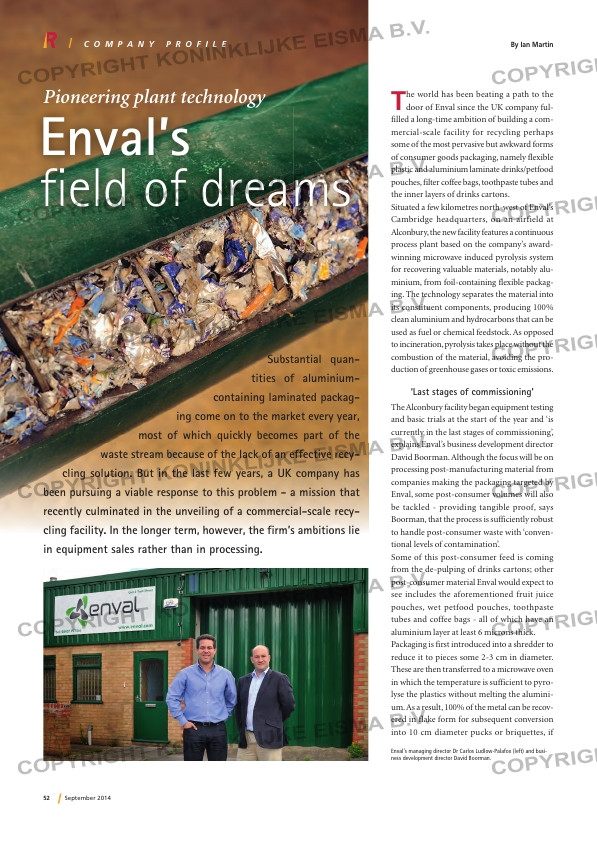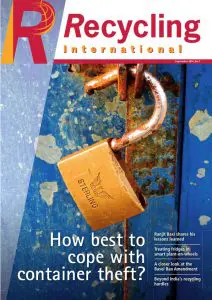Page 52 from: September 2014

52 September 2014
Enval’s
field of dreams
Substantial quan-
tities of aluminium-
containing laminated packag-
ing come on to the market every year,
most of which quickly becomes part of the
waste stream because of the lack of an effective recy-
cling solution. But in the last few years, a UK company has
been pursuing a viable response to this problem – a mission that
recently culminated in the unveiling of a commercial-scale recy-
cling facility. In the longer term, however, the firm’s ambitions lie
in equipment sales rather than in processing.
The world has been beating a path to the door of Enval since the UK company ful-
filled a long-time ambition of building a com-
mercial-scale facility for recycling perhaps
some of the most pervasive but awkward forms
of consumer goods packaging, namely flexible
plastic and aluminium laminate drinks/petfood
pouches, filter coffee bags, toothpaste tubes and
the inner layers of drinks cartons.
Situated a few kilometres north-west of Enval’s
Cambridge headquarters, on an airfield at
Alconbury, the new facility features a continuous
process plant based on the company’s award-
winning microwave induced pyrolysis system
for recovering valuable materials, notably alu-
minium, from foil-containing flexible packag-
ing. The technology separates the material into
its constituent components, producing 100%
clean aluminium and hydrocarbons that can be
used as fuel or chemical feedstock. As opposed
to incineration, pyrolysis takes place without the
combustion of the material, avoiding the pro-
duction of greenhouse gases or toxic emissions.
‘Last stages of commissioning’
The Alconbury facility began equipment testing
and basic trials at the start of the year and ‘is
currently in the last stages of commissioning’,
explains Enval’s business development director
David Boorman. Although the focus will be on
processing post-manufacturing material from
companies making the packaging targeted by
Enval, some post-consumer volumes will also
be tackled – providing tangible proof, says
Boorman, that the process is sufficiently robust
to handle post-consumer waste with ‘conven-
tional levels of contamination’.
Some of this post-consumer feed is coming
from the de-pulping of drinks cartons; other
post-consumer material Enval would expect to
see includes the aforementioned fruit juice
pouches, wet petfood pouches, toothpaste
tubes and coffee bags – all of which have an
aluminium layer at least 6 microns thick.
Packaging is first introduced into a shredder to
reduce it to pieces some 2-3 cm in diameter.
These are then transferred to a microwave oven
in which the temperature is sufficient to pyro-
lyse the plastics without melting the alumini-
um. As a result, 100% of the metal can be recov-
ered in flake form for subsequent conversion
into 10 cm diameter pucks or briquettes, if
C O M P A N Y P R O F I L E By Ian Martin
Enval’s managing director Dr Carlos Ludlow-Palafox (left) and busi-
ness development director David Boorman.
Pioneering plant technology
RI-7 Enval.indd 52 28-08-14 16:56



